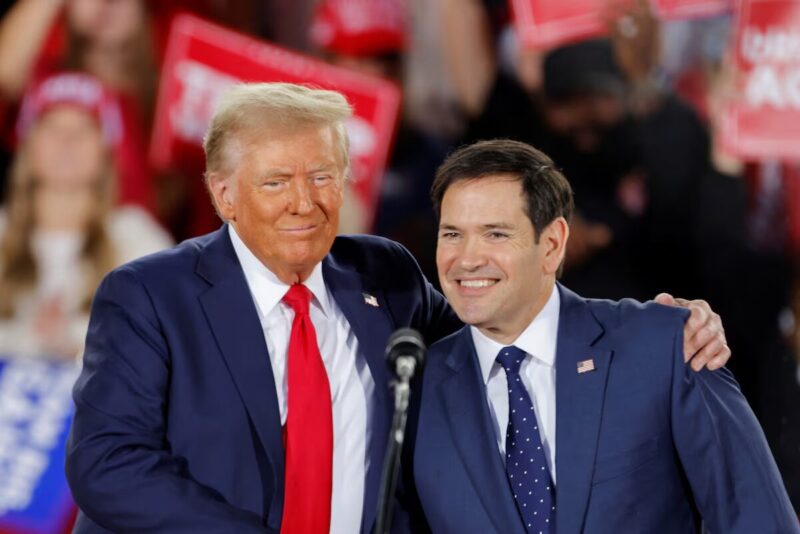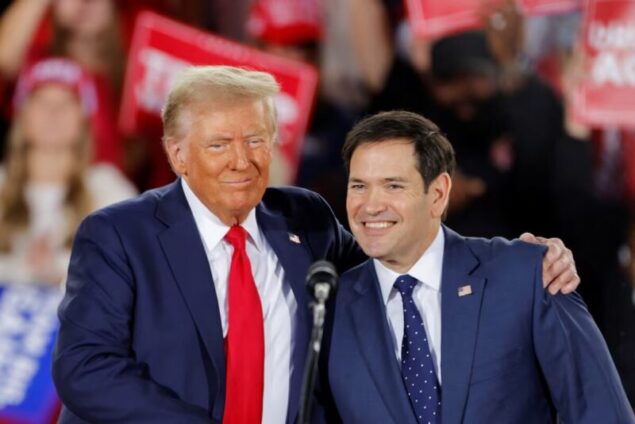
Audio By Carbonatix
Donald Trump is expected to tap U.S. Senator Marco Rubio to be his secretary of state, sources said on Monday, putting the Florida-born politician on track to be the first Latino to serve as America's top diplomat once the Republican president-elect takes office in January.
Rubio was arguably the most hawkish option on Trump's shortlist for secretary of state, and he has in years past advocated for a muscular foreign policy with respect to America's geopolitical foes, including China, Iran and Cuba.
Over the last several years he has softened some of his stances to align more closely with Trump's views. The president-elect accuses past U.S. presidents of leading America into costly and futile wars and has pushed for a more restrained foreign policy.
While the famously mercurial Trump could always change his mind at the last minute, he appeared to have settled on his pick as of Monday, according to the sources, who requested anonymity to discuss private conversations.
Representatives for Trump and Rubio did not immediately respond to requests for comment.
The new administration will confront a world more volatile and dangerous than it was when Trump took office in 2017, with wars raging in Ukraine and the Middle East and China aligning itself more closely with U.S. foes Russia and Iran.
The Ukraine crisis will be high on Rubio's agenda.
Rubio, 53, has said in recent interviews that Ukraine needs to seek a negotiated settlement with Russia rather than focus on regaining all territory that Russia has taken in the last decade. He was also one of 15 Republican senators to vote against a $95 billion military aid package for Ukraine, passed in April.
While Rubio was far from the most isolationist option, his likely selection nonetheless underlines a broad shift in Republican foreign policy views under Trump.
Once the party of hawks who advocated military intervention and a muscular foreign policy, most of Trump's allies now preach restraint, particularly in Europe, where many Republicans complain U.S. allies are not paying their fair share on defence.
"I'm not on Russia's side — but unfortunately the reality of it is that the way the war in Ukraine is going to end is with a negotiated settlement," Rubio told NBC in September.
Rubio's selection holds domestic as well as international significance.
Trump beat Democratic Vice President Kamala Harris in the Nov. 5 election in part by winning over large numbers of Latinos, who had voted overwhelmingly for Democrats in previous election cycles but have become an increasingly diverse demographic in a political sense, with more and more Latinos voting Republican.
By selecting Rubio for a key policy role, Trump may help consolidate electoral gains among Latinos and make clear that they have a place at the highest levels of his administration.

Rubio was one of three final contenders for Trump's vice-presidential pick. The president-elect ultimately chose U.S. Senator JD Vance of Ohio, a hard-right figure who is known for his isolationist foreign policy positions.
CHINA, CUBA HAWK
Some of Trump's supporters will be sceptical of his decision to tap Rubio, who until recently held muscular foreign policy positions that contradict those of Trump.
During Trump's 2017-2021 term, for instance, Rubio co-sponsored legislation that would make it harder for Trump to withdraw from the North Atlantic Treaty Organization, by requiring two-thirds of the Senate to ratify withdrawal.
Trump has railed for years against NATO member countries that failed to meet agreed military spending targets and warned during the campaign that he would not only refuse to defend nations "delinquent" on funding but would also encourage Russia "to do whatever the hell they want" to them.
Rubio is a top China hawk in the Senate.
Most notably, he called on the Treasury Department in 2019 to launch a national security review of popular Chinese social media app TikTok's acquisition of Musical.ly, prompting an investigation and troubled divestment order.
As the top Republican on the Senate Intelligence Committee, he has also kept up the heat on the Biden administration, demanding it block all sales to Huawei earlier this year after the sanctioned Chinese tech company released a new laptop powered by an Intel AI processor chip.
Rubio, whose grandfather fled Cuba in 1962, is also an outspoken opponent of normalizing relations with the Cuban government, a position Trump shares.
The head of the House subcommittee overseeing Latin American affairs, he is also a frequent and fierce critic of Nicolas Maduro's government in Venezuela.
Latest Stories
-
Ghana is rising again – Mahama declares
2 hours -
Firefighters subdue blaze at Accra’s Tudu, officials warn of busy fire season ahead
2 hours -
New Year’s Luv FM Family Party in the park ends in grand style at Rattray park
2 hours -
Mahama targets digital schools, universal healthcare, and food self-sufficiency in 2026
2 hours -
Ghana’s global image boosted by our world-acclaimed reset agenda – Mahama
3 hours -
Full text: Mahama’s New Year message to the nation
3 hours -
The foundation is laid; now we accelerate and expand in 2026 – Mahama
3 hours -
There is no NPP, CPP nor NDC Ghana, only one Ghana – Mahama
3 hours -
Eduwatch praises education financing gains but warns delays, teacher gaps could derail reforms
3 hours -
Kusaal Wikimedians take local language online in 14-day digital campaign
4 hours -
Stop interfering in each other’s roles – Bole-Bamboi MP appeals to traditional rulers for peace
4 hours -
Playback: President Mahama addressed the nation in New Year message
5 hours -
Industrial and Commercial Workers’ Union call for strong work ethics, economic participation in 2026 new year message
7 hours -
Crossover Joy: Churches in Ghana welcome 2026 with fire and faith
7 hours -
Traffic chaos on Accra–Kumasi Highway leaves hundreds stranded as diversions gridlock
7 hours

